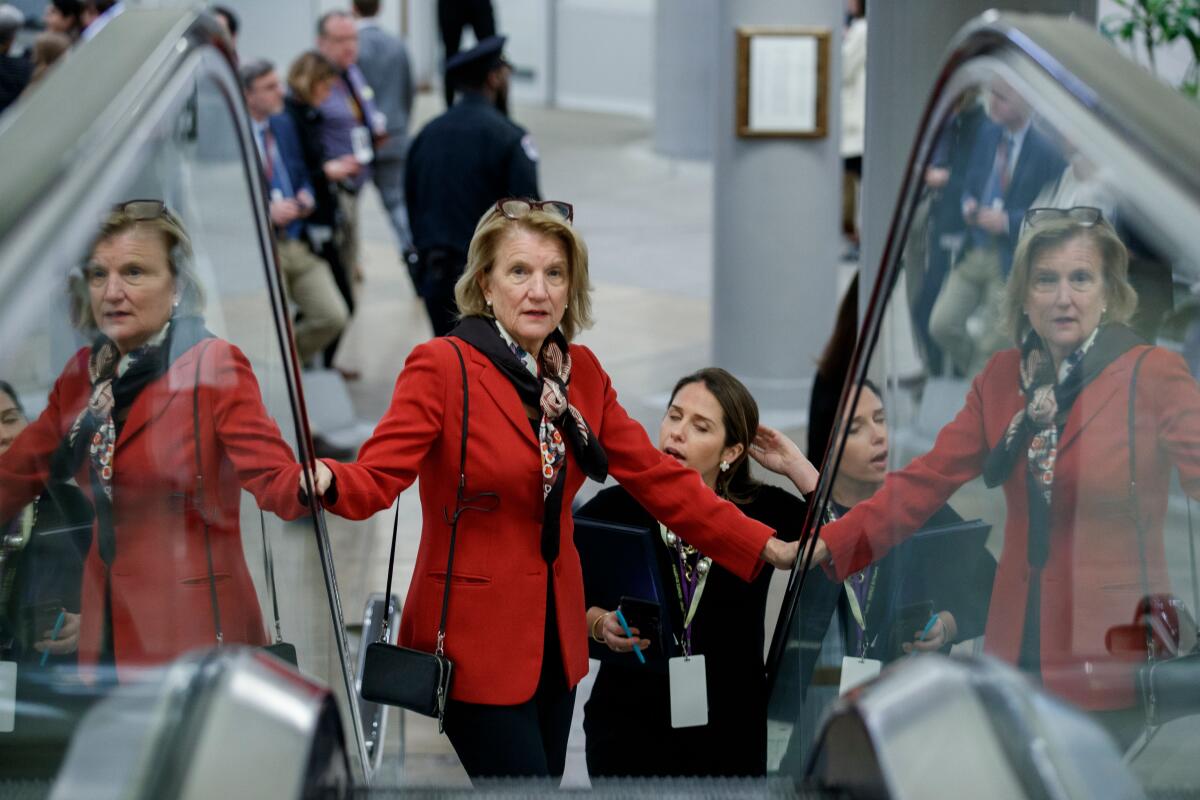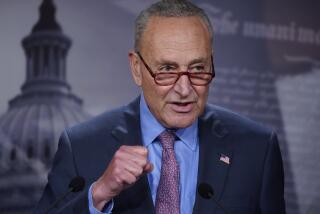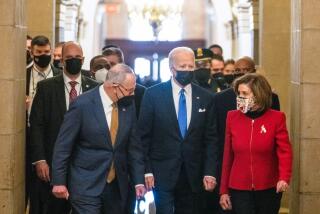Republicans make new infrastructure offer, but the two parties remain far apart

- Share via
WASHINGTON — Senate Republicans on Thursday issued President Biden an offer of a $928-billion infrastructure package in an attempt to revive the slow-moving negotiations over a bipartisan plan to repair the nation’s roads, bridges and broadband internet.
The latest proposal comes days ahead of the White House’s self-imposed soft deadline of Memorial Day to have progress on an agreement, which would be Biden’s first major bipartisan legislative accomplishment.
Senate Republicans are framing their proposal as in line with what Biden personally told them he found acceptable during a recent White House meeting, which was a $1-trillion to $1.2-trillion deal, down significantly from the White House’s latest counterproposal of $1.7 trillion.
“We believe that this counteroffer delivers on what President Biden told us in the Oval Office that day, and that is to try to reach somewhere near $1 trillion over an eight-year period of time,” said Sen. Shelley Moore Capito (R-W.Va.), who is leading negotiations for Senate Republicans. “We have achieved that goal in this counteroffer.”
Democrats balked at the GOP proposal’s significant reliance on repurposing money already approved by Congress in an earlier COVID-19 economic stimulus measure. Only about $257 billion in the Republican plan is considered new spending.
Sen. Patrick J. Toomey (R-Pa.) said about $700 billion in COVID-19 funding has not been spent and cannot be spent by states, and should be applied to the infrastructure plan.
“We believe repurposing these funds needs to be a really important part of how we fill this gap,” he said.
The White House previously said 95% of that money is already allocated for programs such as Paycheck Protection Program loans, unemployment insurance, direct relief checks and tax credits.
Democrats insist that the funding marked for COVID-19 relief — much of it directed to state and local governments — should remain where it is.
Biden, in brief comments to reporters at Joint Base Andrews, Md., before a flight to Ohio, said he had a “good conversation” with Capito and “told her we have to finish this very soon.” Press Secretary Jen Psaki said the White House plans to continue talks next week, even though Congress is scheduled to be out of session for Memorial Day.
Expressing a need for more details from Republicans, Psaki articulated the administration’s “gratitude” for the ongoing dialogue and said the new offer included “several constructive additions to the group’s previous proposals.” But she also voiced concerns that “the [GOP] proposal on how to pay for the plan remains unclear.”
“We are worried that major cuts in COVID relief funds could imperil pending aid to small businesses, restaurants and rural hospitals using this money to get back on their feet after the crush of the pandemic,” Psaki said.
The White House may be already looking beyond these negotiations. Biden referenced a second group of lawmakers working on a backup proposal, expressing interest in their ideas. Sen. Mitt Romney (R-Utah) is working with a bipartisan group of seven other lawmakers on a plan in case the Capito-Biden talks fall through.
“We are also continuing to explore other proposals that we hope will emerge,” Psaki said in a statement.
Senate Minority Leader Mitch McConnell (R-Ky.) indicated in a CNBC interview Thursday morning that Capito’s latest proposal was not the Republicans’ final offer on infrastructure. “We’re open to spending some more,” he said.
Neither side, of course, wants to be seen as the one to end bipartisan talks. Senate Republicans including McConnell and Sen. Roger Wicker of Mississippi have repeatedly suggested that the White House staff is pulling Biden away from the negotiating table.
“If the president gets to make the decision, he will accept this,” Wicker said, echoing a comment that other Senate Republicans have made privately amid souring prospects for an agreement.
The White House has shrugged that off as a “talking point.” Biden, one official noted, signed off on the $1.7-trillion counterproposal made by aides this week.
Both sides remain eager for a deal, and they have plenty of motivation: Every senator’s state has roads in need of repair. After a COVID-19 relief bill passed this year with only Democratic votes, the White House would like a bipartisan win — so much so that Biden appears inclined to continue negotiations with Republicans beyond his Memorial Day deadline.
But the differences between the two parties remain vast: The top-line price tags are hundreds of billions of dollars apart. And they don’t see eye to eye on how to pay for it.
“We’re still far apart and I think the window is closing, but we’re going to keep moving at it and hopefully we’ll find it,” Capito said this week.
Republicans have already rejected the Biden administration’s plan to include proposals that the GOP doesn’t consider infrastructure, such as paid family leave and elder-care programs. Both sides have agreed that this deal, if it can be reached, would exclusively cover “hard” infrastructure, such as roads and bridges.
White House officials say pessimistic tones reported this week were premature. Biden has already dropped his initial $2.3-trillion offer by $500 billion, one administration official noted, demonstrating a willingness to negotiate. (However, Republicans point out that the $500 billion in spending was moved to a separate U.S. competitiveness bill now under debate in the Senate.)
The White House looked to get ahead of the Republicans’ latest infrastructure offer Thursday morning, releasing a memo in which senior advisor Mike Donilon asserts that Biden’s economic agenda is broadly popular.
“As Congress weighs the path forward, the polling shows a clear story: the policies articulated by the President reflect the values deeply held by the American people,” Donilon wrote. “When Republicans criticize the President’s plan to rebuild our economy through long-overdue investments in our country’s infrastructure, they’re criticizing what their own constituents have been urging for decades.”
Even if the parties come to an agreement on the top-line price tag for an infrastructure package, thorny issues await in terms of how to pay for it. Democrats want to raise corporate tax rates, a non-starter for Republicans. The White House has continued to shoot down the GOP’s suggestions to impose new user fees on drivers of electric vehicles or to reallocate funding already authorized as part of the $1.9-trillion COVID-19 relief package enacted in March.
Biden and Democrats on Capitol Hill will soon face a fork in the road on the president’s massive infrastructure proposal: Do they continue in the bipartisan talks in hopes of crafting a small deal with Republicans, and return later to enact the remainder in a Democrats-only proposal? Or do they try to enact the entire plan by themselves?
Many progressives are eager to go it alone, arguing that Republicans may not be serious about finding a bipartisan agreement. That path would require them to enact the legislation through reconciliation, the Senate procedure that allows the majority to circumvent a filibuster.
“My concern is there are no really reliable signs Republicans are willing to do anything up to the magnitude that is necessary,” said Sen. Richard Blumenthal (D-Conn.), who acknowledged he was “highly skeptical” that a meaningful deal could come together.
Ultimately, even if Biden and Republicans can’t reach a deal on infrastructure, engaging with lawmakers in good faith is also largely aimed at an audience of one: Sen. Joe Manchin III (D-W.Va.), a crucial swing vote who has prioritized a bipartisan deal above all.
If and when talks collapse and the White House does pivot to a reconciliation strategy, one official said of the thinking inside the West Wing, Manchin may not acquiesce unless he’s convinced the administration did everything possible to find a bipartisan deal first.
More to Read
Get the L.A. Times Politics newsletter
Deeply reported insights into legislation, politics and policy from Sacramento, Washington and beyond. In your inbox three times per week.
You may occasionally receive promotional content from the Los Angeles Times.












